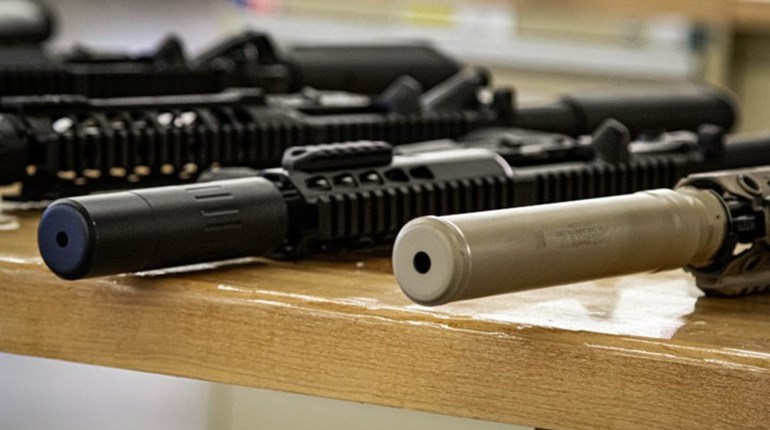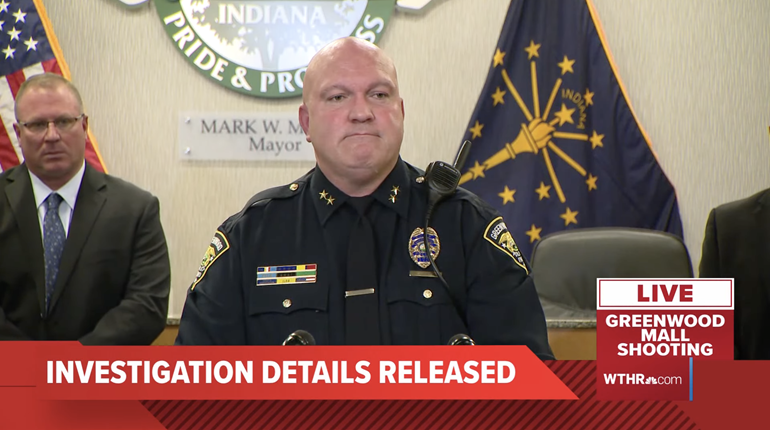
Former Detroit Police Chief James Craig has learned firsthand that the Second Amendment is not a problem in need of a solution.
To find out what can actually make our cities safer, we decided to take a deep look at Detroit. Now, Detroit is no shining city on a hill—it actually took the top spot on the FBI’s violent-crime roster in both 2018 and 2019. It is and has been a troubled city for a lot of reasons. Still, city leaders’ recent response hasn’t been to simply blame American freedom for violence perpetrated by criminals. To understand how they have responded, we interviewed Detroit’s now-former police chief, James Craig.
Before hearing from Craig, however, it’s worth getting a little background. As Craig has explained before—much to the chagrin of national mainstream-media outlets—there are already thousands of gun laws on the books and many of them are not effectively enforced. Even when criminals are caught, many manage to plea-bargain down their offenses or aren’t prosecuted. Even those convicted of violent offenses often serve less than three years behind bars.
Meanwhile, gun-control advocates pretend that a so-called “universal” background check law would somehow reduce violent crime. They say this even though criminals already get around the National Instant Criminal Background Check System (NICS). Most guns recovered from crime scenes were stolen or illegally purchased. Also, every year, over 10,000 people are referred to the federal authorities for lying on a background-check form to get a gun—a felony. Yet every year, the federal government only prosecutes a tiny fraction of these people.
The consequences haven’t been trivial. The Bureau of Alcohol, Tobacco, Firearms and Explosives (ATF) calculated in 2018 that 10-21% of those who lie to pass background checks may go on to commit other gun crimes, while a 2008 Department of Justice (DOJ) survey estimated the risk of someone committing a crime after failing a background check is 28% higher.
Shockingly, high-crime cities like Chicago, Los Angeles and New York have also ranked lowest when it comes to prosecuting gun crimes.
Sometimes this is the result of political priorities. Under the Trump administration, for example, federal prosecutions rose 43%, according to a 2020 DOJ report; there were similar increases under the Bush administration, according to figures from Trac Reports. Under former presidents Bill Clinton and Barack Obama, however, federal gun-crime prosecutions declined. At the time, President Obama’s excuse was insufficient resources. (Tellingly, he also commuted the sentences of over a hundred felons convicted for gun crimes.)
In 2013, then-Vice President Joe Biden complained that “we simply don’t have the time or manpower to prosecute everybody who lies on a form.”
Once elected president, Biden began demanding Congress expand background checks to, among other things, stop people from loaning guns to friends, trying out another person’s gun at a range or selling or giving a gun to a friend, family member or other private citizen. This “universal” background-check idea could only be theoretically enforced if the federal government somehow also had a national gun-registry scheme in place—if “universal” background checks were ever passed by Congress and signed by a president, a national gun registry would be the next thing politicians like Biden would be demanding.

So, What’s Up in Detroit?
As already noted, Detroit is no stranger to challenges. In 2013, the city became the largest municipal government ever to declare bankruptcy, cutting tens of millions of dollars in law-enforcement funding. The city has been plagued by joblessness, corruption, poverty, illiteracy and gangs. Last year’s pandemic and shutdowns left courts shuttered, prisoners released and cases backlogged. Like many cities, Detroit also had a surge in crime in 2020, with police expecting even more violence this year.
In response, led by now-former Police Chief James Craig and other officials in Detroit, the city began a multi-faceted attack on crime in the city.
The department is partnering with the ATF to monitor some social-media accounts to catch convicted felons trying to purchase guns. They’ve deployed technology that helps detect gunshots. (In the first few weeks it was used, the tech helped identify a gang illegally manufacturing weapons.) They’re cracking down on illegal street racing. They’re distributing gun locks to families in a bid to prevent child deaths. They’re also stepping up arrests of those who illegally carry concealed firearms. These arrests have been averaging 60-100 per week—this is an increase of 100% over the previous year. According to Chief Craig, that’s the place to start, because if police don’t crack down on smaller crimes and on those who are legally prohibited from carrying, then criminals feel they can get away with even more crime.
“The key is to focus on individuals illegally carrying guns,” Craig told America’s 1st Freedom. “Doing that, you can reduce the incidents of gun violence, because they’re the ones committing the acts of violence.”
According to the chief, the vast majority of the illegal guns they’re taking from people—most of these are handguns—were illegally acquired by theft or straw purchase. That’s one reason they’re focusing more on the perpetrators, not the peoples’ guns. “Criminals are always going to be able to get access to guns,” Craig said. “They aren’t law abiding; they’re not following the law anyway, so more gun laws don’t mean reduced violence. What we need to do is focus in on our most-violent individuals.”
Craig says much of Detroit has been spared the rhetoric about defunding the police, but he criticized national voices, such as U.S. Rep. Rashida Tlaib (D), who represents Michigan’s 13th District. “[Tlaib] said the whole police profession should be dismantled, and incarceration should be eliminated,” Craig said. “I view those as reckless statements. As a public servant, who are you representing?”
“The people you’re representing don’t want that, so who are you speaking for?” asks Craig. “The people living in vulnerable neighborhoods are often black and brown. Who speaks for them?”
“It’s even more important now that law-abiding citizens be armed.”
—James Craig
Craig also wonders who would enforce the gun laws Rep. Tlaib wants if law enforcement is abolished. In the end, he says, such views are out of touch. “The average citizen isn’t going to stand for that. I’m in a very Democratic city, but the law-abiding people that live here want their guns,” Craig said.
He also took issue with White House spokeswoman Jen Psaki’s claim that the U.S. has a “gun problem.”
“No,” he responded, “we have a criminal problem. Why do we blame it on guns? We need to blame it on criminals.”
If criminals aren’t prosecuted, Craig says, “it’s an incentive to continue violating the law.”
Craig is also concerned that well-meaning judges are emboldening perpetrators with lenient rulings. “Right now in Detroit, I’m hearing there are thirteen individuals charged with premeditated murder who are back out in the community while they await trial. When we make those arrests, judges let them back out into the community. There’s no incentive not to carry a gun. They’ll even joke with our officers: ‘I’ll be out before the end of your shift.’ It’s absolutely disheartening.”
“I understand the pandemic, but candidly, this police department didn’t close,” Craig said. “We’re still on seven days a week, providing safety. We have to make the arrests, but the rest of the system has to work, too, and if it’s broken or dysfunctional, it’ll have a direct impact on violent crime.”
But, says Craig, “it’s not about blaming, I’m not bashing all prosecutors or judges. I recognize staffing plays a role and we work independently of one another. Our prosecutor is charging probably 75%, which is decent. But, at the end of the day, if we all want to reduce violence, we have to work for our communities.”
Prosecutors say that sometimes it’s a question of triage. Not only have Wayne County prosecutors lost some 50 attorneys during the pandemic, but they’re often inundated by cases they think are a higher priority than gun charges.
“I’m not saying these are cases we should not pay attention to; they are,” Wayne County Prosecutor Kym Worthy told the Detroit News. “But when we look at a scale with homicides, sexual assaults, armed robberies, child abuse, elder abuse, domestic violence, car jackings and we look at some of our major cases, we have to figure out how we are going to try all of these cases.”
To fix this, they’re creating a special court docket to clear a backlog of concealed-weapons arrests that is thousands deep and growing. “We’ve never really seen this amount of gun cases in our court,” William McConico, the judge for the 36th district who’s presiding over the docket, told the press. “We don’t want cases just to languish behind other cases.”
Officials are also partnering with federal authorities to target crime. The Department secured grants to hire more officers, and, last year, Detroit became part of “Operation Legend” (later called “Relentless Pursuit”), an initiative launched by the Department of Justice under President Trump to target violent crime and illegal guns. Named after a young boy killed in a shootout, the operation brought an influx of resources to target crime, including money to hire a half-dozen prosecutors and dozens of field agents to address violent crimes.
Matthew Schneider, the former U.S. Attorney for the Eastern District of Michigan who oversaw the project, bulked up the department during his tenure by hiring 40 assistant U.S. attorneys and overseeing federal prosecutions. He told A1F that federal prosecutors often have more resources and can obtain harsher penalties for federal violations, but he also agrees there’s some degree of futility in thinking gun laws will prevent crime.
“I don’t think more laws are the solution,” says Schneider. “The criminals aren’t going to follow these laws; they buy guns on the street. I know gangs that exchange guns, commit a crime and then ship a gun to another location. These people aren’t going through the proper channels at all. It’s an underground market. You can pass any number of laws and people are still going to break them.”
Gun shows aren’t the problem, he says. “I’ve prosecuted hundreds of gun crimes and supervised thousands more. I’ve never in my career as a prosecutor heard of a case of a defendant that got his gun from a gun show. That’s just not where the guns come from.”
Schneider shares Chief Craig’s concern about not locking up violent offenders. “There’s a shift in focus,” he says, “where people charged with gun crimes were taken off the street and put in prison so they weren’t a danger to the community. The focus now seems not to be incarceration. The problem is, there are dangerous people who need to be off the street.”
Schneider says the programs he oversaw were “absolutely successful” and points to decreases in homicides, violent crime and nonfatal shootings.
Chief Craig says the combined efforts are making a difference. “I’m not taking a victory lap,” he acknowledges. “But it’s helping. Our overall crime is down. When you look at other cities, they’ve had more substantial spikes. Because of 2020, all the major cities have seen some spikes, but overall our crime here is better. We still need the rest of the justice system to work effectively. It can’t just be police.”
Motor City hasn’t always done things perfectly. Gun owners have had to file suit due to prolonged delays with concealed-pistol-license processing. Privacy advocates are concerned the ShotSpotter devices and social-media monitoring are too invasive. And critics note the department has a controversial policy of arresting everyone in a car once an illegal gun is found. It’s one of many fine lines the department and Chief Craig have had to walk between enforcement, privacy and security.
Craig made headlines seven years ago, when his vocal support for concealed carry—as well as being featured on the cover of this magazine—drew the ire of gun-control advocates. Has his opinion changed since then?
“It has not,” Craig said. “It’s no secret this has been the most-challenging time in the police profession, and with a lot of conversation about defunding and dismantling the police, it’s even more important now that law-abiding citizens be armed.”
When we interviewed him, Craig was hours away from retiring as chief. As this article was going to print, he said on Fox News that he intended to run for governor of Michigan against Democrat Gretchen Whitmer.


































